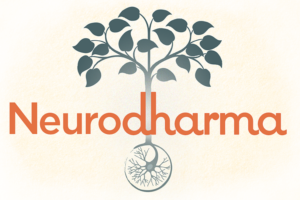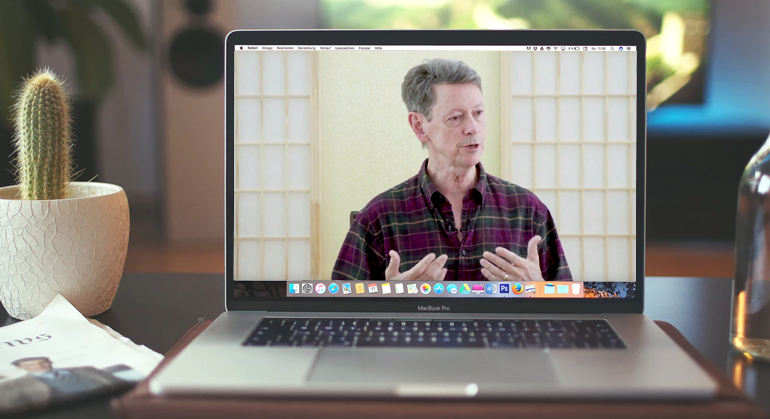Neurodharma Online Program
An Online Series in the Practical Science
of a Steady Mind, a Kind Heart, and Inner Peace
Wake up to who you long to be.
Deep down, we already are who we long to be.
But it’s often covered over with fears and regrets, and daily distractions and stresses.

In this online series with Dr. Rick Hanson, you will experience and develop seven qualities at the heart of the highest happiness – and live from them more deeply and continuously.
You’ll learn from both ancient wisdom and modern neuroscience, engaging your brain and body as you explore the upper reaches of human potential.
You’ll get ideas and methods to be more present, have compassion for yourself and others, rest in a calm and grateful confidence, feel whole, and know your interconnectedness with everything.
This is a path of coming home to an increasingly profound sense of inner freedom, sweet joy, radiant heart, and sublime peace.

Blending Science, Wisdom, and Practice
What is “Dharma”?
This ancient word means what is true — including the truth of suffering, its causes, and a path leading to its end.
What is “Neurodharma”?
This is grounding the truths of the mind in the truths of the body — and using what we’re learning about the brain to protect, nurture, and free the mind.
You’ll get:
Over 15 hours of powerful video teachings on the science and wisdom of Neurodharma
Over 6 hours of guided practices
8 weeks of guidance with weekly email encouragement
Downloadable handouts and audio files
Lifetime access and a 30-day full-refund guarantee
We’ll draw on recent research about the brain as well as the deep Buddhist analysis of the mind. But there’s nothing to memorize or believe. This is a series of experiential practices, whose true test is your own direct sense of their benefits for you.
The Transformational Practices of Neurodharma:
In this series, you’ll explore ways of being that are both hallmarks of the highest forms of human development and at the core of who you already are. Through these 7 powerful practices, you’ll feel increasingly centered in your fundamental goodness, enoughness, and wakefulness.

Steadying the Mind
Become more mindful and stable instead of scattered and distracted

Resting in Fullness
Be calm, contented, and confident – not chasing pleasure or fighting pain

Receiving Nowness
Appreciate this moment, continuously, while letting go of worries and regrets

Warming the Heart
Cultivate compassion and kindness, even as you deal with conflicts

Being Wholeness
Become less fragmented, embracing all of yourself without shame or denial

Opening into Allness
Experience your life as a local expression
of everything

Finding Timelessness
Explore stillness, spaciousness, and possibility – your true nature
In each one of these practices, we’ll consider what could be happening in your brain as you experience them in your mind — and how to use this knowledge to stabilize these ways of being in the living body.
It’s a great kindness, to feel safe, well-resourced and embraced in community; this training lead me to feel at home in these states of being. Once you know how to go home, you can find your way back there on your own. Thanks Rick, for showing me the way, and handing me a map.
The Neurodharma experience was one of the most extraordinary of my life. Many of my fears and deepest despair were finally given the nudge to leave me as never before. I am forever grateful and awed.
Rick gave me a framework to move through my largely unconscious ‘blocks’ and go to a deeper place in meditation. Whatever you level of practice, I’m sure you’re going to get something very powerful and helpful from this course. I heartily recommend it to beginners and experienced practitioners alike.
A hard-to-find pairing of current neuroscience and advanced Buddhist teaching. A surprising experience.
Neurodharma has left an ever deepening impression on my soul. The geek in me met the Buddha and the two have been delightully co-habiting since!
I’ve spent a lot of time, money, and effort studying with premier teachers for 50 years now. Rick’s pragmatic contextualizing, profound teachings, genuine warmth, humor, and wisdom is a transmission I heartily recommend for anybody.
Neurodharma is Rick Hanson’s best course to date. It is a creative and edifying presentation of the intersection of neuroscience, phenomenology, and Buddhism. Rick’s delivery is easygoing, yet informative and precise. The profundity of these authentic teachings gradually disclose themselves through a blend of Rick’s instruction and one’s practice. I wholeheartedly recommend this course to anyone interested in a multi-disciplinary approach to mindfulness.
What You’ll Receive
Grounded in science and practical methods, this series explores the highest possibilities of human development. Drawing on the insights of some of the wisest people who have ever lived, it follows a path that is good in the beginning, the middle, and the end— and full of curiosity, joy, and wonder. You can return to it again and again for inspiration, renewal, and guidance.

Over 10 Hours of Powerful Teachings
from Rick’s Neurodharma retreat about the mind and the brain, embodied practice, our true nature, and effective tools for daily life
Over 6 Hours of Guided Meditations
to open more into these ways of being while also hardwiring them into your nervous system — so you take them with you wherever you go


Over 5 Hours of Expanded Teachings
diving deeper into fascinating brain science, practical applications, and individual issues
Downloadable Handouts and Audio Files
to access the teachings and meditations whenever you want


8 Weeks of Step-by-Step Guidance
including weekly encouragement emails to keep you inspired and motivated on your journey
Lifetime Access and a 30-Day Full-Refund Guarantee
Get Started:
$349
Frequently Asked Questions
Is this for everyone?
The ideas and experiential practices in this series have been used in various forms by countless people throughout history to explore the upper reaches of human potential. They are powerful vehicles . . . . but because they are powerful they can stir things up, especially in people who have a history of complex PTSD, bipolar disorder, borderline personality, dissociation, or psychotic process. If any of these apply to you, we suggest that you consider not doing Neurodharma, and if you have already purchased it, you can contact us to get a full refund.
Is this a self-paced series, or do I need to watch it at a specific time?
You can start right away, engaging it at your own pace, and you have Lifetime Access to everything in the series.
Are there scholarships available?
For those unable to pay for the Neurodharma online series – such as students, people on a small fixed income, disabled, unemployed or on public assistance, or many people in third world countries – there are scholarships available.
Do I need any special technology to participate?
All you need is an internet connection, and a computer, tablet, or phone with a browser.
Can I get Continuing Education Credits?
This series is no longer eligible for Continuing Education Credit.
If you purchased the CE package with the program prior to November 5, 2021, you can still receive the CE credit.
What if I need to cancel after I've registered?
No worries, just send us an email at news@rickhanson.net and we’ll process your cancellation and refund within 24 business hours.
When does the 30-day money-back guarantee end?
The 30-day money-back guarantee is good for 30 days from the time that you purchase the series.
What is the duration and structure of the series?
STRUCTURE
Neurodharma is organized into 8 different “Steps” – Steadying the Mind, Warming the Heart, Resting in Fullness, Being Wholeness, Receiving Nowness, Opening into Allness, Finding Timelessness, and Integration.
– Talk (10-45 minutes)
– Guided Meditation (20-45 minutes)
– Deeper Dive Videos (4-10 videos, up to 45 minutes in length total)
– Talk (10-45 minutes)
– Guided Meditation (20-45 minutes)
– Deeper Dive Videos (4-10 videos, up to 45 minutes in length total)
Can I see an outline/table of contents?
- Part 1: Practicing with the Mind
- Part 2: Benevolence toward Yourself
- Part 1: Practicing with a Warm Heart
- Part 2: Our Social Brain
- Part 1: Embodied Causes of Craving
- Part 2: The Five Hindrances
- Part 1: Experiencing Wholeness
- Part 2: Finding Refuge
- Part 1: Being Here Now
- Part 2: Accepting Impermanence
- Part 1: The Person Process
- Part 2: Allocentric Experiencing + An Expansive View
- Part 1: The Unconditioned
- Part 2: Nibbana and the Brain
- Part 1: Letting Things Settle and Connect
- Part 2: Making the Offering + Going Forth
How is Neurodharma different than the Foundations of Well-Being?
To put it simply, the Foundations of Well-Being program aims to address normal-range healing, resilience, and well-being, while the Neurodharma program aims at the upper range of human potential, with a strong emphasis on contemplative practice and insight.
Getting into the details, below are some of the main differences between the two programs.
The Neurodharma program aims to develop 7 essential ways of being found in the great sages and teachers throughout history. Remarkably, these same qualities can also be found deep inside ourselves, though usually covered over with stresses and distractions. These 7 ways of being are both the results of practice and methods of practice; in effect, as is said in Tibet, we can take the fruit as the path.
These 7 ways of being are: steadying the mind; warming the heart; resting in fullness; being wholeness; receiving nowness; opening into allness; and finding timelessness. Each of these can be experienced as simply a taste all the way to complete development. They all support each other, and in the Neurodharma program we explore them, step by step, as a path of awakening the best within us.
This path uses the deep Buddhist analysis of the mind as a roadmap, while drawing greatly from modern neuroscience and psychology along the way. Our emphasis is practical, experiential, and open-minded. No background in Buddhism or brain science is necessary. While we appreciate the contemplative traditions and science itself, there is nothing in this program about persuading you to either of these.
The Foundations of Well-Being program focuses on 12 inner strengths to help you cope with the challenges of life while being happier, calmer, and more confident. While we do refer to the program as a “Path”, it is much less linear than the Neurodharma program, and more like a “buffet” of sorts – where you can pick and choose the parts that speak most to you and your specific needs for safety, satisfaction, and connection. While Rick may occasionally refer to wisdom traditions, it is not a focus in this program.
Are the Guided Practices in real time or are they recorded?
The guided practices are recorded and can be downloaded to listen to wherever you go.